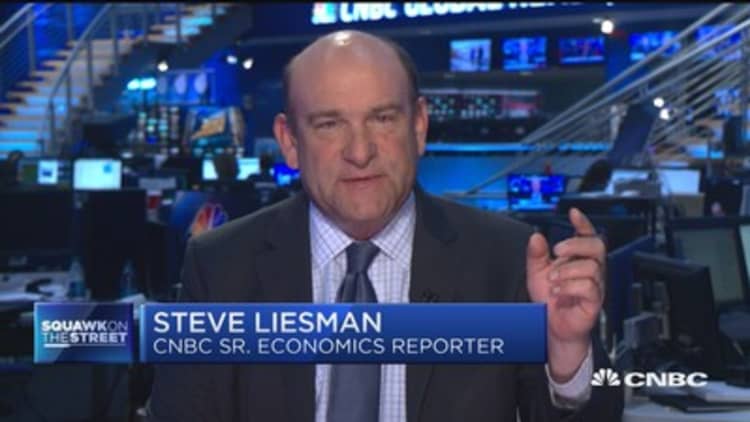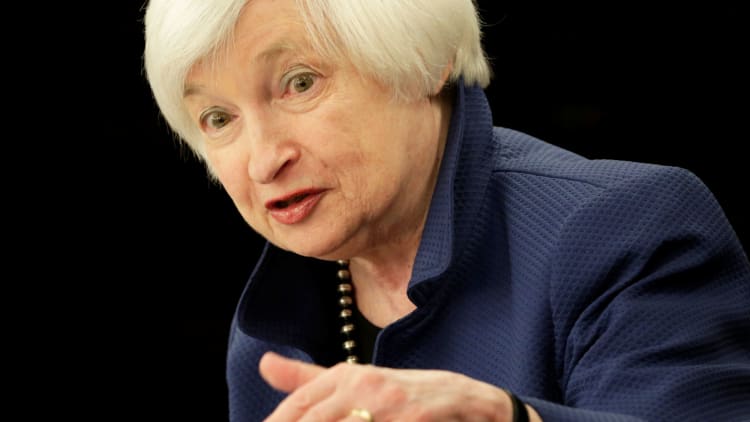
May's disappointing job growth delivered another blow to hopes that the U.S. economy is on the cusp of breaking out.
Job creation fell well short of economist expectations, with just 138,000 new positions created against estimates for 185,000. The unemployment rate declined to a 16-year low of 4.3 percent, but that was because of a drop in the labor force participation rate.
More broadly, though, the numbers serve as a reminder that hopes for breakout growth this year are likely to be dashed, and in fairly short order. As Washington lawmakers struggle to push through any aspects of President Donald Trump's pro-growth agenda, the reality is sinking in that any gains now are likely to be felt in 2018 at least or perhaps even longer.
Talk of "animal spirits" in January and February — with their respective payroll gains of 216,000 and 232,000 — is now replaced with expectations for more of the same as 2017 plays out.
"It just seems as if lower employment gains in part are consistent with the demographics and labor force participation rates in the U.S.," said John Silvia, chief economist at Wells Fargo. "I would suspect the days of 200,000 jobs per month are gone. We're now dealing with 160,000 or 180,000 for the rest of the year, if we're lucky."
That's not the way it was supposed to be, but it now appears the chatter earlier this year was misplaced.
"It was a head fake in the sense that some people believed that we were going to have a lot of economic policy actions early," Silvia added. "It's still legitimate to say that we're going to have those policy actions that may affect 2018. But a lot of people built up too much optimism about how quickly economic policy gets through Washington."
For its part, the Trump administration tried to put a happy face on the numbers Friday.
Gary Cohn, Trump's chief economic advisor, told CNBC that he remains confident in the progress of the economy and said, "We have to create a better and better job market in the United States." However, his bragging that the administration is "clearly bringing people back into the job force" is a little misleading.
In fact, the labor force has increased by just 68,000 through the first five months, well below the 148,000 for the same period in 2016 and the 425,000 in 2015. Though the unemployment rate that includes discouraged and underemployed workers has dropped a full percentage point this year to 8.4 percent, the labor force and its composition remain a problem for broader economic growth.
"We expected the jobs market to take a slight breather, with 185,000 for May, but including the downward revisions the month before, this report feels more like an early summer vacation instead of a pause," Beth Ann Bovino, chief U.S. economist at S&P Global Ratings, said in a note. "Given reports that job openings are near all-time highs, it suggests that businesses are struggling to fill these positions in an increasingly tighter market."
Economists and Federal Reserve policymakers also remain baffled at the lack of positive inflation signs, in particular wage increases.
Average hourly earnings are rising at just a 2.5 percent pace — Deutsche Bank called it "the new 3 percent" — even though jobs seem harder to come by. Tightness in the labor market should be pushing harder on wages, but that does not appear to be the case.
The tepid wage pressures along with "further evidence of a still-modest consumer, restrained business investment, and tepid domestic manufacturing, undermines the notion of better conditions or a more robust economic picture lurking around the corner," said Lindsey Piegza, chief economist at Stifel Fixed Income.
Stocks still rising, but bonds are scared
To be sure, the financial markets don't seem to mind.
Despite yet another weak economic signal, the stock market went on its merry way Friday, with major averages posting slight gains heading into midday.
The bond market, however, has been telling another story, consistently forecasting much more lukewarm growth than its equity counterpart. As is often the case, at least in terms of the economic picture, it's an ongoing argument that fixed income seems to be winning.
That's critical as the Fed prepares for a likely rate hike later this month. Fed Governor Lael Brainard earlier this week spoke about the inflation issue, saying that it "is a source of concern," and pointed out that inflation has remained below the Fed's 2 percent target for 58 straight months, or nearly five years.
"Fundamentally, growth is slower than people have penciled in for the year," said Kathy Jones, chief fixed income strategist at Charles Schwab. "The bond market is not concerned that the Fed is behind the curve — it may be concerned that the Fed s a little ahead of the curve. The bond market is currently not seeing the world the same way as the stock market."
The world itself seems more complicated than one where a little pro-growth rhetoric about lower taxes, less regulation and more infrastructure spending would cast a spell over the economy and push growth higher.
Wells Fargo's Silvia believes the labor market problems specifically require more complicated solutions.
"There are some tax policy changes, some regulatory policies that could be done. More fundamentally, it's microeconomics," he said. "It's trying to get people talking about skills mismatch. ... We need to focus a lot more on education, the opioid epidemic, we need to think about the labor force participation rate for women."
"These are the micro policies, not the macro policies you see on TV," he added. "They're very hard to implement."
WATCH: Goldman Sachs economist Jan Hatzius goes inside the jobs numbers



